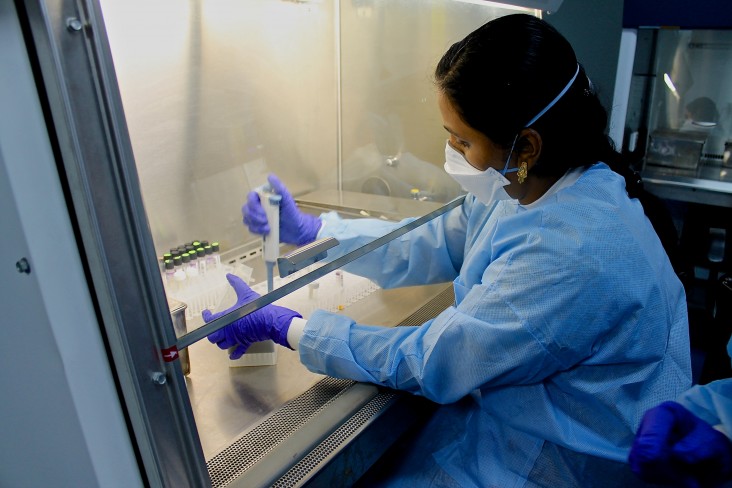
February 2016—Tuberculosis (TB) is silently killing India. An estimated 2.2 million cases are reported annually in the country, 220,000 of which prove fatal. This is the highest number of deaths from TB anywhere in the world.
USAID’s support to the Government of India’s Revised National TB Control Program has led to improvements in TB case detection and treatment success rates, and to achieving national targets in priority geographic areas. Interventions are designed to improve and scale comprehensive HIV/TB services; strengthen and accredit laboratories for diagnosis of multidrug-resistant TB; improve airborne infection control; introduce new diagnostics; and increase involvement of private providers.
Beginning in 1999, the international Stop TB Partnership, supported in part by USAID, worked closely with the Government of India to implement the Revised National TB Control Program—the largest TB control program in the world. In the last 18 years, USAID has spent $100 million to support the program, working in partnership with the Ministry of Health and local health care providers.
This assistance helped the World Health Organization (WHO) establish an extensive network of qualified medical practitioners nationwide who support the government’s TB officers, working at both the provincial and central levels. Thousands of Indian doctors and paramedical staff have been trained by WHO through STOP TB to ensure quality implementation of the national control program and data reporting together with district and state officials.
Since the launch of the Stop TB Partnership, USAID has helped the Government of India to treat over 15 million people. The case detection rate has increased from a meager 30 percent to 70 percent, while the treatment success rate has improved from 35 percent to 85 percent across the country.
Recently, as the Government of India revised its goal from stopping TB to ending the epidemic, USAID shifted its focus to the need for private sector and local community engagement. At the national level, USAID supports the government’s Call to Action for a TB-Free India—a full-scale campaign launched nationwide on April 23, 2015, to engage health care providers, corporate partners, media, celebrities, civil society, academia and patients. The campaign encourages the adoption of best practices for the prevention, detection and treatment of TB, and works to reduce the social stigma associated with the disease and empower communities to end TB.
USAID is also supporting the testing and scaling of innovations that improve detection, diagnosis and treatment adherence, including the first national anti-TB drug resistance survey and the first large-scale pilot project to diagnose TB among people living with HIV.
“It’s been a long and tiring journey so far, but a fulfilling one nonetheless," says Reuben Swamickan, a TB specialist and USAID adviser. “Though the disease continues to kill and disrupt the lives of too many people in India, we have not given up, and never will until we achieve a TB-free India.”
USAID recently initiated new projects to support the Government of India’s efforts to end TB in India. As part of the $15 million Tuberculosis Health Action Learning Initiative, USAID will test and scale solutions to prevent, diagnose and treat TB in four Indian cities. Under a $6 million-project with the Resource Group for Education and Advocacy for Community Health, USAID will work with medical associations and health care providers in select states and districts to support implementation of best practices for TB diagnosis and treatment as well as conducting behavior change campaigns for patients and providers.
LINKS
Follow @usaid_india, on Facebook, on Flickr, on YouTube







Comment
Make a general inquiry or suggest an improvement.